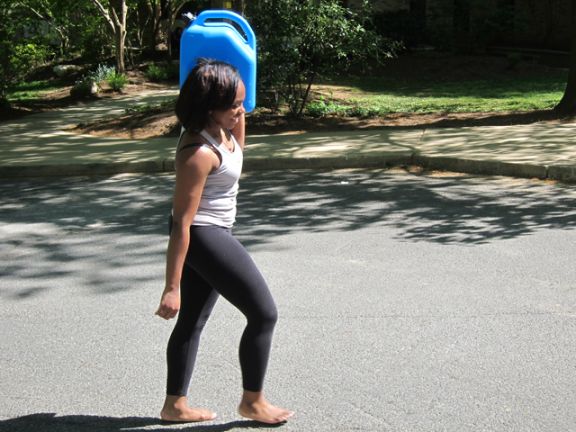
by Jessica Johnson-Petty and Chelbi Mims
Hearing stories of hunger, starvation, the need for water supply and poverty are very emotional. Even though a picture is worth a million words, the truth is never captured by text in comparison to gaining the experience first hand.
Catholic Relief Services student ambassadors on campus began planning the first annual Food Fast Retreat six months ago and on Sunday, April 29, their dreams were put into action. The ambassadors began planning this event because they wanted to bring awareness to the many people in the United States and globally who suffer from food insecurity.
“The purpose of the Food Fast Retreat was to live in solidarity with the many around the world that go hungry each day,” Kelsey Kastrava, vice president of CRS Ambassadors, said.
The 14 students and three faculty who participated spent 10 hours fasting, interacting in case-study scenarios and then reflecting, in order to put themselves in the shoes of the many who go hungry daily.
“I gained a better understanding of how the hungry people in the world have to live on a daily basis,” Maura Lemke, a freshman undecided major, said.
The day began with an icebreaker to help the students get to know each other.
“The ice breaker was one of my favorite parts. It woke me up and helped me get to know everyone that I would be spending my entire day with,” Michelle Attanasio, a junior graphic design major, said.
The real work then began. Dr. Jerry Zurek, professor of communication, led a discussion about the poor and vulnerable domestically. He showed a video about a marine veteran who is now impoverished and works at a daycare center barely making enough to pay her bills. The young lady in the video spoke about how some nights she doesn’t eat because there is only enough food for her children. Her children take full advantage of the free breakfast and free lunch provided from the school system. She said that if the government cuts funding for the Supplemental Nutrition Assistance Program, she does not know what would happen to her family.
“Educate your hearts because your hearts help choose what your brains think,” Zurek said.
“It was crazy to see someone that someone who served our country is now poor; that was really heartbreaking,” MaryKate McCann, sophomore communication major, said.
The day then progressed with Dr. Suzanne Toton, associate professor of theology and religions studies at Villanova University, speaking to the group about global hunger. She began by telling the students statistics from Bread for the World, that 1.4 billion people in developing countries live in extreme poverty. She then talked about why it is ethically just for the students to open their hearts to people suffering from hunger and what the Obama administration is doing to fight this matter.
“We need to create a society that is just and inclusive and makes us all better off, not just a society where no one starves,” Toton said.
The day also consisted of many large group activities to help the participants physically experience what life is like in developing countries.
The activity that had everyone challenged mentally, physically and emotionally was the water activity. Participants were then in for a surprise. None of the participants thought that the task would be as difficult as what was ahead. Each person had the obligation to get five gallons of water from the pond at King of Prussia Road and carry the 40 pound container to the Commons to distribute for the needs of their family. The needs were symbolized by three buckets: bathing and washing, cooking food and the third for drinking water. They had to walk from the front of the library to the pond and fill the jug and walk back carrying the jug.
When they reached the Commons, they met the feeling of defeat once they realized that the water was contaminated and others had parasites. They were sent back for more water because their first water could not be used.
Traditionally, only the women do this task overseas. Ironically the female participants were more willing to finish the task and push through the obstacles.
“As I was carrying the water I thought how fortunate I am to have food on my table, a roof over my head and people to rely on if I need help,” Lemke said.
The 10-hour fast concluded with a religious ceremony at Mass and then finally a meal of soup and bread in which each student served his or her neighbor.
“Even though it was a small example of what other people in the US and other countries go through in regards to food security, it really made me think and really inspired me to want to do more to help them,” Danielle Alio, senior communication major, said.


